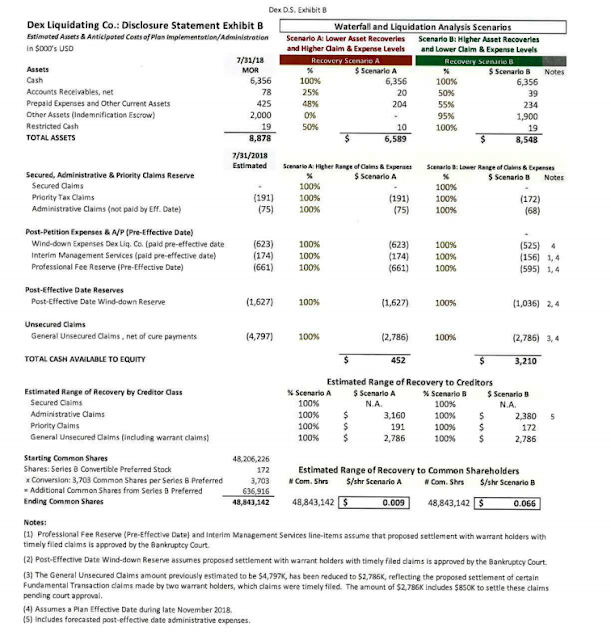Lime Energy Going Private Transaction
Yet again we have another idea for the very small investor. Lime Energy is doing a very similar thing as PBOX and cashing out its shareholders on record who hold less than either 300, 500, or 1,000 (depending on how the vote goes) at a price of $2.49 .
They're a little bit farther along in the process than PBOX is and have a date for the meeting, January 31st at 9:00am.
The two main parties of this company are Bison Capital who own 30.1% of the outstanding shares and Mr. Capps who owns 29.7%, respectively. They easily decide the vote AND they would vote for in favor of the reverse/forward split because the company saves $825k-1M by going private (ie not having to file reports with the SEC).
The question is will they vote to cash out those who own less than 300, 500, or 1,000?
According to the proxy as of December 20th there were about 900 shareholders of record. 467 stockholders held only a single share, and 650 stockholders held less than 10 shares.
From a company's point of view I would think you would want to spend the least amount of cash as possible while still getting the shareholders on record under 300. By spending less than $5,720 (assuming the 183 who own more than 1 share, own 10 shares) you could save $825k. Good deal in my book.
This is also assuming that more and more people aren't taking advantage of this cash out. What would happen if people took advantage of it and the company spends too much on the cash out? Would they still go through with it?
Well for one thing, if they were to spend anywhere substantially less than the $825k they'd have to pay on regulatory costs, it'd be worth it, so lets say the cash out amount was $500k. At $2.49/share and 999 shares per person, that would mean about 200 additional people would have to become new shareholders on record and own 999 shares.
Since December 20th there's been less than 100 trades in the stock and some of them have been for substantially more than 1k. So far it seems like there's not a lot of attention on the cash out. In addition, any more attention to the trade would drive the stock price up to $2.49 thus destroying the opportunity.
Finally, the last question I'll pose to you guys is if Lime Energy saves $825k/year on their bottom line, wouldn't it be a substantially better company? But then if people realize this will it make it that much tougher to get under 300 shareholders? The game theory is entertaining with these situations.
They're a little bit farther along in the process than PBOX is and have a date for the meeting, January 31st at 9:00am.
The two main parties of this company are Bison Capital who own 30.1% of the outstanding shares and Mr. Capps who owns 29.7%, respectively. They easily decide the vote AND they would vote for in favor of the reverse/forward split because the company saves $825k-1M by going private (ie not having to file reports with the SEC).
The question is will they vote to cash out those who own less than 300, 500, or 1,000?
According to the proxy as of December 20th there were about 900 shareholders of record. 467 stockholders held only a single share, and 650 stockholders held less than 10 shares.
From a company's point of view I would think you would want to spend the least amount of cash as possible while still getting the shareholders on record under 300. By spending less than $5,720 (assuming the 183 who own more than 1 share, own 10 shares) you could save $825k. Good deal in my book.
This is also assuming that more and more people aren't taking advantage of this cash out. What would happen if people took advantage of it and the company spends too much on the cash out? Would they still go through with it?
Well for one thing, if they were to spend anywhere substantially less than the $825k they'd have to pay on regulatory costs, it'd be worth it, so lets say the cash out amount was $500k. At $2.49/share and 999 shares per person, that would mean about 200 additional people would have to become new shareholders on record and own 999 shares.
Since December 20th there's been less than 100 trades in the stock and some of them have been for substantially more than 1k. So far it seems like there's not a lot of attention on the cash out. In addition, any more attention to the trade would drive the stock price up to $2.49 thus destroying the opportunity.
Finally, the last question I'll pose to you guys is if Lime Energy saves $825k/year on their bottom line, wouldn't it be a substantially better company? But then if people realize this will it make it that much tougher to get under 300 shareholders? The game theory is entertaining with these situations.
